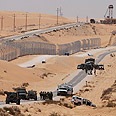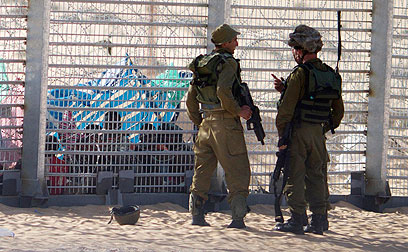
Activists: IDF blocked food transfer to infiltrators
Physicians for Human Rights claims soldiers prevented its members from reaching group of African asylum seekers trapped between fences along Israel-Egypt border. 'Israel shirking legal, moral obligations,' activist says; Interior Ministry: Israel not obligated to let group in
A number of social activists and members of human rights groups claimed that the IDF prevented them from transferring food to African asylum seekers trapped between fences on the Israel-Egypt border overnight Wednesday.
The activists said the army explained that the area was a closed military zone and denied them access to the infiltrators.
Related articles:
- Protest: 'Refugees are not cancer'
- African migrant: Where did IDF bury my baby?
- Report: 90% drop in number of infiltrators
It was reported that the group of 20 Eritrean migrants have been trapped between the fences for five days after attempting to cross into Israel. They were caught by obstacles that line the border area, within Israeli territory.
The IDF said soldiers have been ordered to give them water.
"We left Tel Aviv with bags filled with food and canned goods with the aim of reaching the trapped asylum seekers," said Physicians for Human Rights-Israel activist Yaniv Fenig.

Africans trapped between fences (Photo: AP)
The 30-year-old med student told Ynet the activists arrived at the border region at around midnight and began heading towards the infiltrators on foot. "When we were about half a kilometer away an IDF vehicle arrived and soldiers asked us to clear out, claiming it was a closed military zone," he said.
Fenig said the activists left the area, but were later told by an IDF officer at the scene that the infiltrators were not being provided with any food. He said that when the activists asked what the army expects the infiltrators to do, the battalion commander replied: 'They should walk back a few meters into Egypt, where they will get all the assistance they need.'
"The soldiers accompanied us out of what they said was a closed military zone. We left the food with them and asked that they give it to the asylum seekers," the activist said.
Fenig said the trip was organized after they learned that "people were starving in the scorching heat and their lives are in danger.
"The goal was to help ease their suffering, which, absurdly, is being caused by the State of Israel. Israel is shirking all of its legal and moral obligations," the activist said.
"It's absurd that people who, according to recent accounts, suffered torture and rape are now trapped between two fences and Israel is trying to starve them in hopes that they will walk back towards Egyptian positions," Fenig argued.
Early Wednesday morning saw another group of activists head to the border area to try and transfer food to the trapped Africans.
'Israel not obligated to allow entry'
In a legal opinion issued on Wednesday, the Interior Ministry asserted that Israel does not have "any legal duty to allow entrance to refugees located beyond the border."
"As per the international practices and the relevant precedents, the fence marks the actual border. Anyone who is located beyond the border is not located within Israel's territory, and is ineligible for entry," the legal opinion read.
"There has been no ruling made by an international agency to determine that the Sudanese or the Eritreans are prosecuted in Egypt or are found in mortal danger there."
Interior Minister Eli Yishai addressed the issue as well, saying that while he is not indifferent to the fate of the asylum seekers, his primary duty is to tend to the state and its residents.
"The State of Israel has become a destination for infiltrators and migrant workers, so much so that it sometimes appears as though many parts within it are no longer part of the Jewish Zionist state," he said.
"I am saddened by the situation of the infiltrators on Israel's border," he added. "I am not indifferent to their circumstances, as well as the circumstances of millions of others in the world. I wish I had the power to help and heal."
Some two weeks ago, Israel allowed a group of African migrants into the country on humanitarian grounds, after they camped out at a border-adjacent reservoir.
Once in Israel, they received medical attention and were then transferred to a holding facility.
Attorney Oded Feller of the Association for Civil Rights in Israel said, "Israel has every right to build a border fence, but this fence does not exempt it from its duties.
"If people are begging for their lives at the foot of that fence, we must make sure that their lives are not in danger, and if one awaits them – we must let them in. They cannot be allowed to starve. This is a disgrace," he said.















